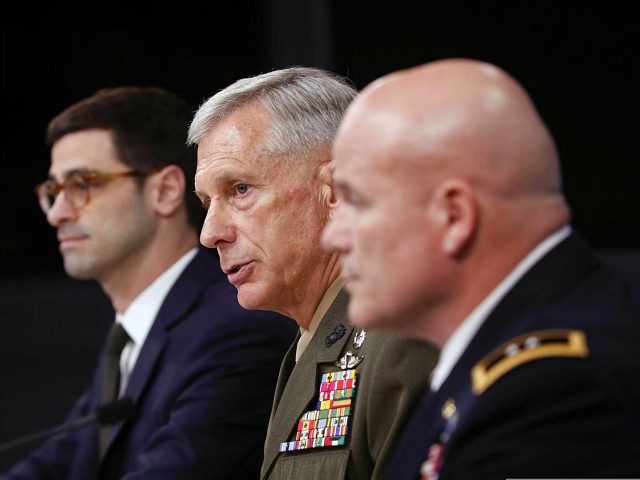The Pentagon on Thursday released its final report on the ambush in Niger that killed four U.S. troops on October 4, 2017.
The report cited “systemic issues” including insufficient training and confusion about mission objectives, specifically the decision by the team to pursue a high-value Islamic State target without obtaining proper command approval.
Stars & Stripes summarizes the report, which includes some 6,000 pages of evidence, most of which is still under review by the Pentagon before public distribution:
The investigation found the members of the Special Forces team – in Niger to train and assist that nation’s forces to fight terrorism – had spent insufficient time training together before deployment, misled higher-ups about the intention of their initial mission, were twice re-tasked to other missions and failed to report they were taking enemy fire until nearly an hour after the ambush started.
The report summary reveals the team of soldiers – including the men who died – fought bravely alongside their Nigerien counterparts, fending off the attack, which lasted nearly six hours, and recommends officials consider recognition for valorous acts during the engagement. Two additional Americans were wounded in the encounter and four Nigerien troops died.
It also determined each of the four Americans killed in action died shortly after receiving wounds from small arms fire and none were ever captured alive by enemy fighters, including Sgt. La David Johnson, whose body was not discovered for nearly two days following the skirmish after he and two Nigerien soldiers were separated from the team and killed nearly a half mile from the location where they were ambushed.
According to the Pentagon, AFRICOM was not aware that the team was conducting an operation against a senior member of the Islamic State in the Greater Sahara, and would have required more extensive planning and rehearsal if it had known.
The commanding officer of the team, who is not named in the report, “inaccurately characterized the nature of the mission” as a patrol to meet with a village leader. The team stopped at the village of Tongo Tongo and held an impromptu meeting with an elder on its way back to base, where they were ambushed by an enemy force that soon proved to be much larger than it initially appeared.
The report states that headquarters was notified of the ambush 53 minutes into the firefight. 47 minutes later, French Mirage fighter jets arrived on the scene and conducted four “shows of force” to intimidate the ISIS fighters, but could not deploy ordnance because they were uncertain where the American troops and allied forces were located.
The Pentagon did not specifically blame anyone for the ambush but reportedly indicated three individuals who could face disciplinary action. A review of Special Forces training and operations policies for working with foreign partners was recommended.
Senator Tim Kaine (D-VA), who ran on the 2016 Democratic ticket as Hillary Clinton’s vice presidential candidate, took the opportunity of the report to suggest the operation in Niger was illegal.
“I believe that the troops who were sadly killed in Niger in October of 2017 were engaged in a mission that they were not authorized by law to participate in and that they were not trained to participate in, and that is a significant reason that they tragically lost their lives,” said Kaine.
Secretary of Defense Jim Mattis ordered AFRICOM commander Gen. Thomas Waldhauser to take immediate steps to address the problems described by the report and prepare a review in fourth months.
“I take ownership of all the events connected to the ambush of 4 October. Again, the responsibility is mine,” said Waldhauser at a press conference on Thursday.
“We are now far more prudent on our missions,” he added.

COMMENTS
Please let us know if you're having issues with commenting.